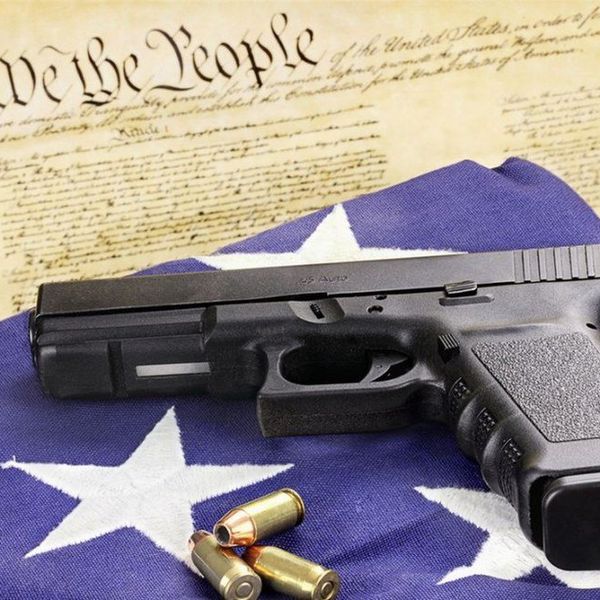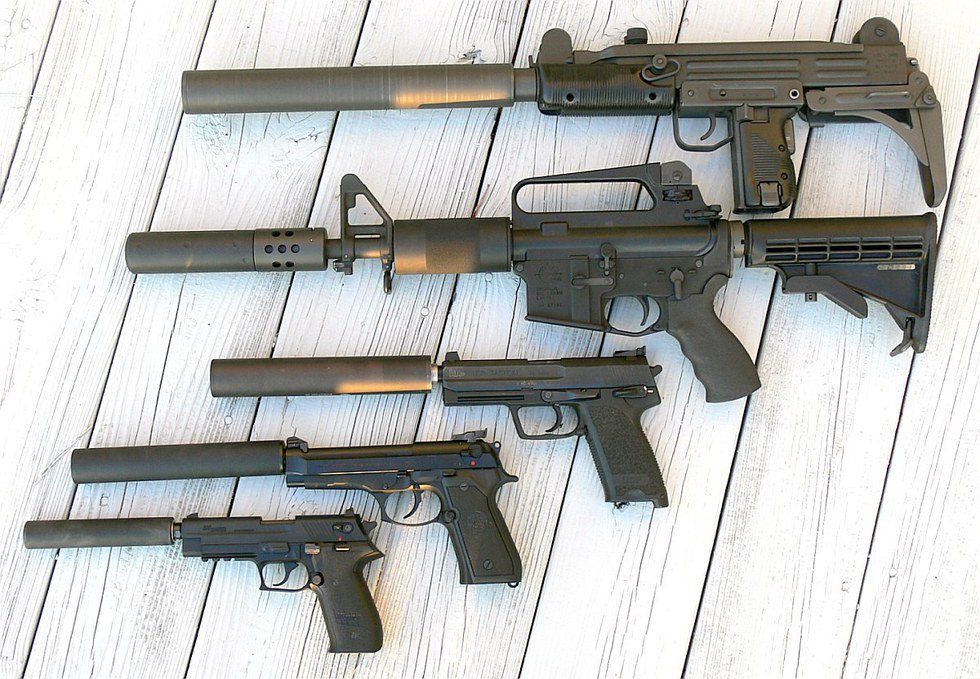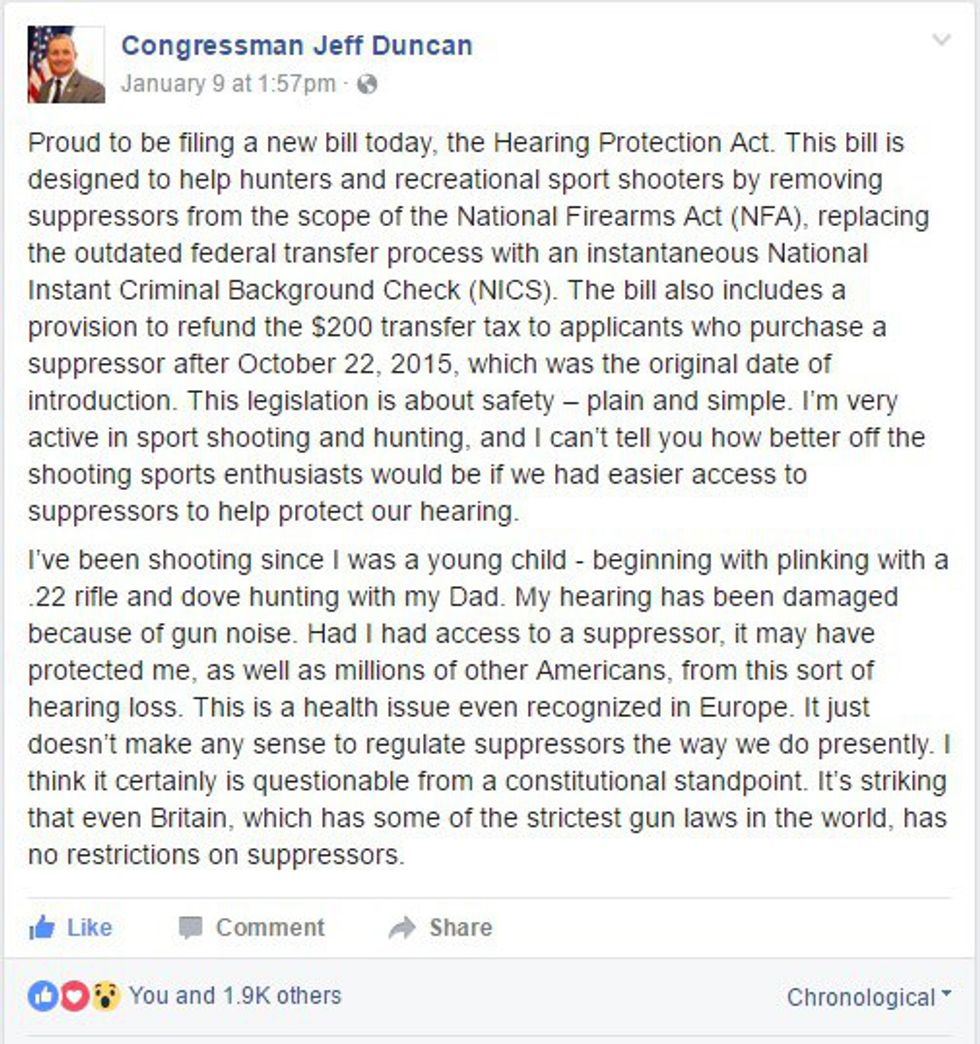In a move that many of us consider to be thoughtful and long overdue, South Carolina representative Jeff Duncan recently introduced the Hearing Protection Act. The provisions are rather simple: reclassify suppressors on firearms and their status under federal law. Rep. Duncan states that the current U.S. regulations on firearm suppressors are extreme even by developed country standards, and aren't found in even the strictest of nations such as the U.K. This proposal will not eliminate restrictions on suppressors, but ease them to more moderate standards.
Before forming an opinion on this bill, it is important to understand the current status of suppressors: both legally and functionally. Currently, suppressors are regulated under the scope of the National Firearms Act (NFA), as are machine guns and destructive devices. The procedure for buying an NFA-restricted item is intense, including ATF approval, registration, and a $200 tax, in addition to a very comprehensive background check. The Hearing Protection Act would remove suppressors from this category, and instead require an NICS background check - the same background check conducted when buying a firearm. In short, this means suppressors would no longer be treated with the same extreme as machine guns and destructive devices, but would instead be treated the same as your everyday rifle or pistol. Instead of an extremely tedious and expensive process, which needless prevents many responsible and well-intended people from acquiring them, the process becomes accessible to the average law-abiding citizen.
So, why is this a good thing? First and foremost, a suppressor is not a silencer. The argument against suppressors lies in the idea that they make crime more impossible to detect, and shooters more impossible to locate. This is an idea fabricated by Hollywood, video games, and those without real-world experience. The constant misuse of the term "silencer" instead of "suppressor" only serves to continue this misunderstanding.
A suppressor often works by slowing and somewhat controlling the escape of the various propellant gases from a round. Per the aforementioned source, the noise reduction is usually around 20-40 decibels. To put it in perspective, this is not very far off from the standard effects of commercial earplugs. Anyone who responsibly fires a weapon in a training or recreational situation wears ear protection, and we can all attest that the sound of a gunshot is still very noticeable and very identifiable. Needless to say, a suppressor will also not eliminate the sounds generated from the bullet's flight path, impact with a target, or the mechanical components of the firearm.
As Duncan himself said, the primary benefit of suppressors is simple: to protect your hearing. We treat our firearm safety with extreme redundancy - such as the use of a safety, muzzle control, and trigger discipline - and it only makes sense to protect our hearing with the same mindset as well. Earplugs are great, but earplugs and a suppressor can do so much more. Shooting takes a toll on your hearing, and it only makes sense to mitigate it. Furthermore, the benefits would extend to nearby persons, such as from a range in a populated area.
Of course, the training benefits are of note as well. As with anything, when training a new shooter, many prefer to follow a more progressive program. You don't hand somebody a .454 Casull revolver, point them at a moving target, and wish them luck. As we prefer to try to limit the recoil a first-time shooter may experience, we should try to limit the sound as well. I've heard countless shooting sports advocates praise suppressors as invaluable tools for training new shooters due to the slight decrease in noise, and in fact, suppressors have been shown to decrease recoil as well. I think we can all agree that effective and efficient training is paramount for anyone who wants to be a gun owner, and anything to assist that process is a benefit.
Lastly, there is one less significant but still notable benefit of suppressors, and one that can relate heavily to self-defense: reducing muzzle flash. Renowned ammunition manufacturer Buffalo Bore markets a number of their ammunition products as flash-suppressed due to the realistic possibility of being blinded by your own gunfire, and the cover of darkness can provide an ideal setting for aggressive criminals. From my own training in human factors and physiology - which I gained during the course of pilot training - I can say that the switch to 'night vision' in the human eye (transitioning from cones to rods) takes approximately half an hour, while losing that night vision can occur in less than a second. The blinding effects of a muzzle flash in a self-defense situation only compound the already extreme effects of adrenaline and fight-or-flight response, and the combination of stress, deteriorated motor skills, and inability to see can easily get you killed. I find any reduction in muzzle flash to be advantageous in this case, and suppressors fill that role. Is this practical for concealed carry? Maybe not, but it is still a consideration for handgun and rifle defense within the home, and can help save a life and mitigate collateral damage.
All in all, this Hearing Protection Act is way overdue. The benefits? Shooters save their hearing, ranges and backyard shooting becomes less of a nuisance, new shooters are more easily trained, and maybe someone can even save their vision and focus in a life-threatening situation. The drawbacks? In the minds of the concerned but uninformed public - undetectable crime. In reality - nothing. Not only do suppressors fail to make a gun "silent" or "undetectable," but their improvisation is common as well, in spite of legal restrictions.
Please, for the sake of our hearing, and in defiance of the myths spread by Hollywood, take a minute to consider supporting the Hearing Protection Act. From all of us responsible and law-abiding gun owners out there, we will thank you.






















